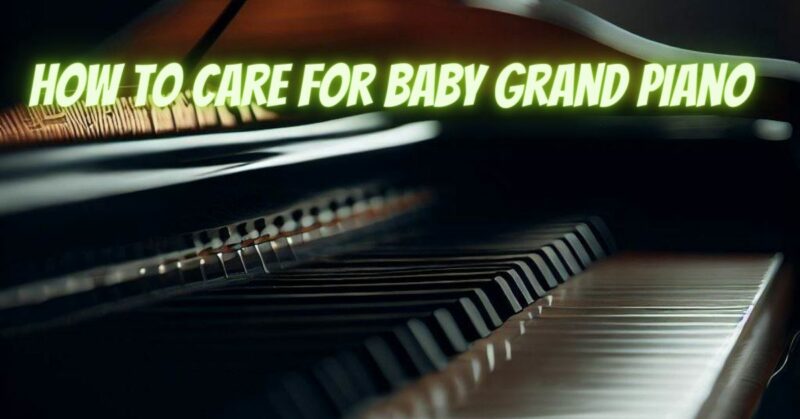Owning a baby grand piano is a delightful experience, as it adds elegance and musicality to any space. To ensure the longevity and optimal performance of your instrument, proper care and maintenance are essential. In this article, we will provide you with valuable tips and guidelines on how to care for your baby grand piano, allowing you to enjoy its beautiful sound and maintain its value for years to come.
- Placement and Environment:
a. Select an appropriate location for your baby grand piano, away from direct sunlight, heating vents, and windows. Extreme temperature fluctuations and exposure to sunlight can damage the finish and affect the tuning stability.
b. Maintain a consistent humidity level in the room, ideally between 40% and 50%, using a humidifier or dehumidifier if necessary. Fluctuations in humidity can cause the piano’s wood to expand or contract, potentially affecting its tuning and overall performance.
- Regular Cleaning:
a. Dust the piano regularly using a soft, lint-free cloth. Start from the top and work your way down, gently wiping the keys, cabinet, and other exposed surfaces. Avoid using any abrasive cleaners or chemicals that may damage the finish.
b. For stubborn dirt or fingerprints, lightly dampen the cloth with a mild, non-abrasive piano cleaner or a solution of water and a small amount of gentle dish soap. Wipe the affected areas and immediately follow with a dry cloth to remove any excess moisture.
- Tuning and Maintenance:
a. Schedule regular professional tunings for your baby grand piano at least twice a year or as recommended by a piano technician. Professional tunings ensure accurate pitch and can address any issues with the instrument’s internal components.
b. Avoid attempting to tune the piano yourself unless you have proper training and experience. Piano tuning requires specialized skills and tools that professional tuners possess.
c. Keep the piano lid closed when not in use to protect the internal components from dust, humidity, and other environmental factors.
- Protecting the Finish:
a. Use a piano cover or a grand piano slipcover to protect the piano from dust, pet hair, and accidental spills when it’s not in use for an extended period.
b. Avoid placing objects, including drinks and food, on the piano. Accidental spills can damage the finish and potentially harm the internal components.
- Regular Inspections:
a. Periodically inspect the piano for any signs of wear, loose parts, or unusual sounds. If you notice any issues, contact a qualified piano technician for inspection and repairs.
b. Maintain regular communication with your piano technician and address any concerns promptly. They can provide expert advice on maintaining your baby grand piano’s health and addressing any technical issues.
Conclusion:
Caring for your baby grand piano is crucial for its longevity and performance. By following the tips and guidelines outlined in this article, you can ensure that your instrument remains in excellent condition. Regular cleaning, proper placement, scheduling professional tunings, and addressing any concerns with the help of a qualified technician are key aspects of maintaining a beautiful and well-functioning baby grand piano. Enjoy the joy of playing and listening to the enchanting melodies that your instrument produces for years to come.


